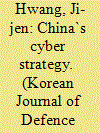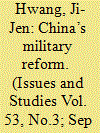|
|
|
Sort Order |
|
|
|
Items / Page
|
|
|
|
|
|
|
| Srl | Item |
| 1 |
ID:
151256


|
|
|
|
|
| Summary/Abstract |
People`s War was originally considered a military concept suited to the traditional battlefields of mainland China, involving the mobilization of the massive populace in order for the inferior forces of the Chinese Communist Party (CCP) to defeat a superior adversary. However, in the past few decades, this tradition of People`s War has not merely been useful for developing military strategy, but has also been applicable to many other national developments, such as economics, social modernization, and government and public affairs, as a vital “behind-the-scenes” guideline to garner a certain consensus from the Chinese people in order to carry out the policies that the Chinese government wishes to implement. In particular, this tradition can be perfectly applied to China`s cyber warfare in the digital age, as the strategic value of cyberspace has removed the restriction of traditional geographic barriers and borders between states. Thus, the potential masses of Chinese “cyber warriors” can carry out attacks geographically unhindered in cyberspace. It is thus of global significance that China, a rising world superpower, is currently expending great effort on developing warfare in cyberspace. This paper investigates how China`s fundamental strategic doctrine, People`s War―which is traditionally based upon geographical battlegrounds―can be integrated into the concept of cyberspace as a potential battlefield. Meanwhile, some interviews were also conducted in Taiwan in order to further dissect some thematic propositions merged from documentary resources.
|
|
|
|
|
|
|
|
|
|
|
|
|
|
|
|
| 2 |
ID:
158043


|
|
|
|
|
| Summary/Abstract |
In late 2015, the Chinese leadership announced sweeping reforms designed to bring the military into the modern era, signaling a departure from a traditional over-dependence on ground forces and incorporating extensive structural reorganization to create a more balanced joint command system. The reform aims to create a system suited to the modern conditions of informatization, with direct leadership from the Central Military Commission, and is bolstered by the Chinese military’s advancement in progressive information technology, space technology, and cyber security. With the creation of a new Strategic Support Force (SSF), China has clearly demarcated the operational command of traditional and non-traditional warfare within the military system, representing a strategic and tactical step forward that gives greater scope to the People’s Liberation Army (PLA) to dominate in non-traditional military theaters. While the military reform has the potential to affect military strategy around Asia and further afield, the extent of China’s deep and far-reaching military reform, with a view to consolidating military capabilities under a joint command and giving full rein to non-traditional warfare under conditions of informatization, represents a particularly significant factor in the stability of cross-strait relations and security. This study will outline the creation of the SSF under the new reform, and discuss the development of China’s strategy and tactics for non-traditional warfare under conditions of informatization. The implications of the military reform will then be put into the cross-strait context, in order to draw conclusions concerning the potential impact on cross-strait security.
|
|
|
|
|
|
|
|
|
|
|
|
|
|
|
|
|
|
|
|
|